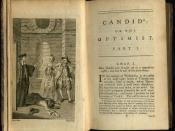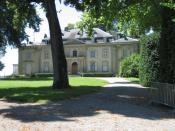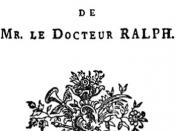Matthew Churchill Western Civilization M/W/F 8:10-9:00 Voltaire's Candide During the enlightenment of Europe, when ideas were constantly changing, both in the fields of science and philosophy, the philosophe Voltaire wrote his satire Candide. Enlightenment ideas were characterized with a belief in rational thought and reason to govern people's lives and society rather than faith in religion. Enlightenment philosophers wanted to rid society of the superstition and narrow-mindedness surrounding the Church and the aristocracy. The central plot of the story is Candide's quest to once again meet his lost lover Lady Cunegond after he is exiled from his beloved castle in Westphalia.
In Voltaire's time, the church still had political powers and many superstitious beliefs. Voltaire felt that established religion crushed the human spirit and alienated people, and that to be free, man needed to "Ecrasez l'infame"�, or crush the horrible thing. He shows the narrow-mindedness of the Church when Candide visits the city of Lisbon which is hit by a powerful and devastating earthquake during his stay.
A leader in the city, The Grand Inquisitor believed that God was punishing the city with the earthquake for the wickedness of its inhabitants. So to appease God, he orders certain people to be burned at the stake, a Biscayan for marrying his godmother, and two Portuguese for refusing to eat bacon. The Inquisitor also orders the hanging of Candide's mentor, Professor Pangloss for voicing his opinions and Candide for listening with a supposed "approving air"�. The Inquisitor really had no basis for condemning these people to the death except for them simply being different than everyone else.
Voltaire believed that men were inherently greedy and selfish, and expressed that opinion when Candide and his companion Cacambo find the lost city of gold, Eldorado. Eldorado was a utopia, free of...


